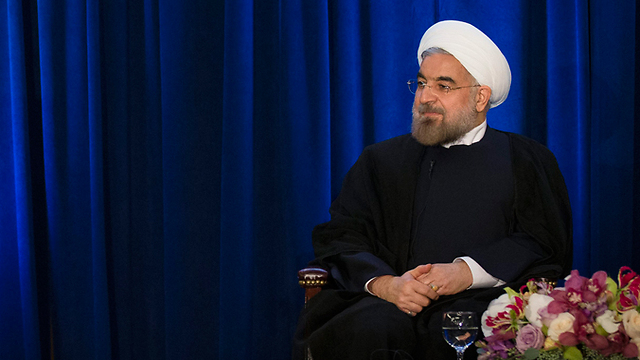"The government is not optimistic about the Westerners and the current negotiations," he was quoted as saying, echoing similar comments by supreme leader Ayatollah Ali Khamenei Sunday.
Related stories:
- Iran: Christians sentenced to 80 lashes for drinking wine
- Rohani: Zionist Israelis commit acts of sabotage
ISIS: Iran's bomb-making timeline shortens
"But it does not mean that we should not have hope for removing the problems," Rohani said, referring to international sanctions that have battered Iran's ailing economy.
The remarks came a day after Khamenei, who has final word on Iran's nuclear drive, said he is not optimistic about the talks but supports them as they are incapable of hurting the Islamic republic.
"I am not optimistic about the negotiations but, with the grace of God, we will not suffer losses either," said Khamenei. "I do not think the negotiations will produce the results expected by Iran," he added.
Death to America Day
Prime Minister Benjamin Netanyahu addressed the Iranian issue during Sunday's cabinet meeting and said, "There are changes within the Iranian public. However, tomorrow on 'Death to America Day' which has been marked there for 34 years, similar calls are being made against us. It only goes to show we must keep up the pressure on the Iranian regime."
World powers are set to resume talks with Iranian negotiators in Geneva on November 7 and 8, to build up on a "substantive" meeting last month when Iran tabled a new proposal.
Hassan Rohani not feeling optimistic (Photo: AP)
Western powers and Israel suspect Iran is pursuing nuclear arms in the guise of a civilian program, accusations repeatedly denied by Tehran.
Only Sunday, outgoing National Security Advisor Yaakov Amidror stressed that the State must remain prepared, since there has been no significant change on the Iranian front. Sanctions coupled with threats to strike are working, he asserted.
At a farewell reception in the Prime Minister's Office, Amidror later added that "Israel is facing one clear existential threat and we must do everything in our power to remove it. If we can, via talks, if we can't – some other way.
"Nowadays, the Middle East is undergoing many changes and upheavals, and many more upheavals are to be expected. This tricky situation, perhaps the trickiest in the 40 years I've been dealing with these issues, calls for great caution and a lot of thought.
- Receive Ynetnews updates
directly to your desktop
















